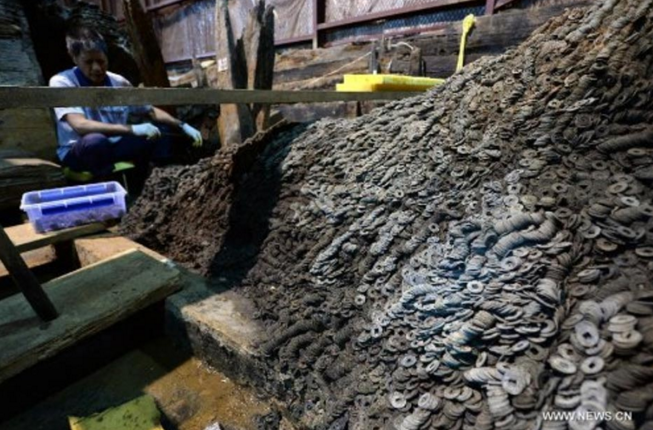Archaeologists discover an ancient Chinese tomb filled with riches — and maybe even an emperor

A free daily email with the biggest news stories of the day – and the best features from TheWeek.com
You are now subscribed
Your newsletter sign-up was successful
Chinese Emperor Liu He may have only ruled for 27 days, but a recent archaeological discovery suggests he might still have received a lavish burial. Archaeologists have unearthed an ancient Han Dynasty tomb in China's Jiangxi province that contains eight tombs and a chariot burial site — and they believe one of those tombs may belong to the emperor.
The tomb stretches 40,000 square meters and is filled with treasure. So far, archaeologists have discovered 10 tons of Wuzhu bronze coins, musical instruments, five chariots, sacrificed horses, as well as "more than 10,000 other gold, bronze and iron items, wooden tablets bamboo slips, and jade articles," Ancient Origins says.
The next phase of work for the archaeologists will be excavating the coffin in the tomb's central mausoleum. "There may be a royal seal and jade clothes that will suggest the status and identity of the tomb's occupant," Xin Lixiang of the China National Museum, who is heading the site, said.
The Week
Escape your echo chamber. Get the facts behind the news, plus analysis from multiple perspectives.

Sign up for The Week's Free Newsletters
From our morning news briefing to a weekly Good News Newsletter, get the best of The Week delivered directly to your inbox.
From our morning news briefing to a weekly Good News Newsletter, get the best of The Week delivered directly to your inbox.
Right now, archaeologists are expecting to discover that the tomb belongs to Liu He, the grandson of Emperor Wu, who is described as the "greatest ruler of Han Dynasty," one of China's most prosperous periods. While Liu's grandfather was a great ruler, Liu He was not. He was dethroned as emperor after only 27 days in power because of a lack of talent and a penchant for indulgence.
A free daily email with the biggest news stories of the day – and the best features from TheWeek.com
-
 Political cartoons for February 16
Political cartoons for February 16Cartoons Monday’s political cartoons include President's Day, a valentine from the Epstein files, and more
-
 Regent Hong Kong: a tranquil haven with a prime waterfront spot
Regent Hong Kong: a tranquil haven with a prime waterfront spotThe Week Recommends The trendy hotel recently underwent an extensive two-year revamp
-
 The problem with diagnosing profound autism
The problem with diagnosing profound autismThe Explainer Experts are reconsidering the idea of autism as a spectrum, which could impact diagnoses and policy making for the condition
-
 Nobody seems surprised Wagner's Prigozhin died under suspicious circumstances
Nobody seems surprised Wagner's Prigozhin died under suspicious circumstancesSpeed Read
-
 Western mountain climbers allegedly left Pakistani porter to die on K2
Western mountain climbers allegedly left Pakistani porter to die on K2Speed Read
-
 'Circular saw blades' divide controversial Rio Grande buoys installed by Texas governor
'Circular saw blades' divide controversial Rio Grande buoys installed by Texas governorSpeed Read
-
 Los Angeles city workers stage 1-day walkout over labor conditions
Los Angeles city workers stage 1-day walkout over labor conditionsSpeed Read
-
 Mega Millions jackpot climbs to an estimated $1.55 billion
Mega Millions jackpot climbs to an estimated $1.55 billionSpeed Read
-
 Bangladesh dealing with worst dengue fever outbreak on record
Bangladesh dealing with worst dengue fever outbreak on recordSpeed Read
-
 Glacial outburst flooding in Juneau destroys homes
Glacial outburst flooding in Juneau destroys homesSpeed Read
-
 Scotland seeking 'monster hunters' to search for fabled Loch Ness creature
Scotland seeking 'monster hunters' to search for fabled Loch Ness creatureSpeed Read